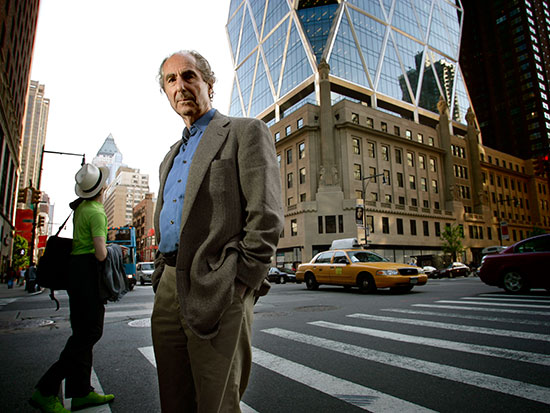
|
在谷歌上搜索“恩里克·阿德尔曼”(Enrico Adelman)这个名字,你并不会找到关于这个纽约书店老板的太多信息。 仅有的那些部分,大都也围绕着他出名的原因——一些人之所以认识他,仅仅是由于他认识已故的知名作家菲利普·罗斯。不过对于这位72岁的老人,还是有很多值得了解的地方的。他出生在二战期间的意大利,曾在纽约的切尔西旅馆住过一段时间,他开了一家叫做Bloomsday的书店——他自己也说过,这家书店在90年代“大赚了一笔”。此外值得一提的,还有他现在的商业模式——完全依赖于亚马逊做生意。此外还有他对特朗普的看法,以及他对奥巴马即将出版的新书的看法(对此他表示:“这本书肯定不如他老婆的书。”并称米歇尔·奥巴马的书《成为》(Becoming)是他这辈子卖得数量最多的一本书)。当然,还有他与菲利普·罗斯第一次见面的经过。 简而言之,阿德尔曼也是一个有故事的人,就算放在罗斯的小说里当一个主角也够格了。或许这就是为什么两人在1989年相识之后,立即成为了好友的原因。当时,阿尔德曼在纽约上西区的Zabar’s美食城附近经营着一家小小的书摊。 回忆起与罗斯第一次见面的场景,他说道:“有两种人非常容易吸引我的兴趣和好奇心:作家和歌剧演员。有一天,一个男人和一个女人来到我的书摊,我马上注意到了那个男人。两三分钟后,我忍不住走上前说道:‘你长得很像菲利普·罗斯’。他说:‘我就是。’然后伸出手来和我握手。我觉得自己简直就像被神触摸了一样。” |
A mere Google search of the name “Enrico Adelman” doesn’t do the New York bookseller justice. Although much of what’s been written about him centers around his notorious claim to fame—his connection to the great, late author Philip Roth—there is much more about the 72-year-old that deserves attention: from his growing up in Italy as a war baby to his time living in New York City’s Chelsea Hotel, from his bookstore Bloomsday—which he says “made a killing” through the 1990s—to his current business model, entirely reliant on Amazon. Not to mention his views on President Trump, his expectations of former President Obama’s upcoming post-presidency book (“It’s not going to do as well as his wife’s did,” he says, revealing that Michelle Obama’s Becoming is the book he’s sold the most copies of throughout his career) and, of course, his first meeting with Roth. In short, Adelman’s life is deserving of a central plotline in one of Roth’s own books. And maybe that’s why the two men hit it off back in 1989, when Adelman was operating his book stand by gourmet food emporium Zabar’s on Manhattan’s Upper West Side. “Two character types appeal to my sense of intrigue and curiosity: writers and opera singers,” Adelman says. “This guy and this woman came to the stand, and I noticed the guy immediately. I couldn’t help myself. After two, three minutes I walked over and said, ‘You look an awful lot like Philip Roth.’ And he just goes, ‘I am’ and puts out his hand to shake. I felt like I was touched by a god.” |
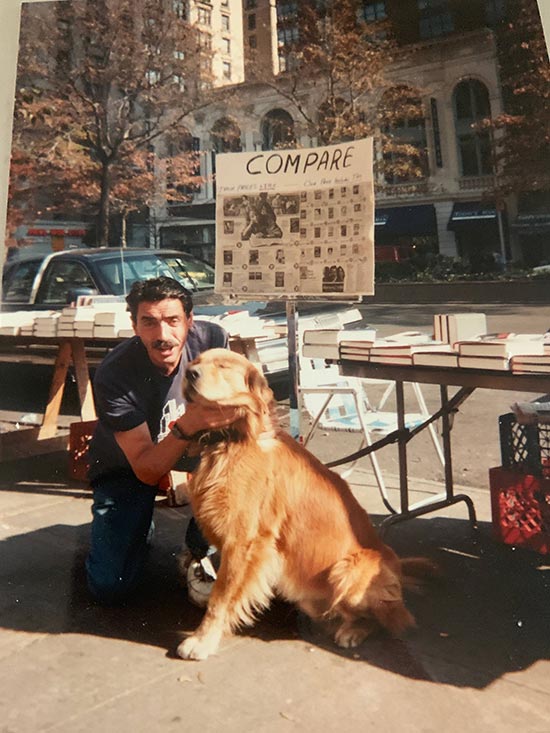
|
随后,阿德尔曼邀请罗斯到他的Bloomsday书店做客——这已经是他第三次开书店了。过了几周,罗斯果然来了。或许觉得罗斯性格随和,阿德尔曼勇敢地要求罗斯在他的几本书上签名。 他俩之间的关系就这样开始了。当然,这或许是因为罗斯愿意在好几千本书上签名,然后交给阿德尔曼去卖的缘故。但两人之间很快建立了更深层次的联系。他们以一种独特的方式代表了纽约精神——一个作家,一个书商,两人都是美籍犹太人,都试图在纽约甚至整个美国传达他们对文学的热爱。阿德尔曼表示:“我有一封他替我写的合作推荐信,他说:‘恩里克·阿德尔曼卖出去的我的书,比美国的任何一个其他人都要多。” |
Adelman went on to invite the author to his brick-and-mortar bookshop, at the time the third iteration of Bloomsday. Roth did show up a few weeks later and, encouraged by his disposition, Adelman bravely asked him to sign a few of his books. Thus began their relationship, one clearly spurred by the writer’s willingness to sign thousands of copies of his books for Adelman to sell, but one that developed into a deeper connection between two characters that have come to represent the essence of New York in their own unique ways. A writer and a bookseller, both American Jews, seeking to spread their devotion to literature within and beyond the confines of New York. “I have a letter of recommendation to my co-op board that he wrote,” Adelman says. “And he states: ‘Enrico Adelman sold more of my books than anybody else in the United States.’” |
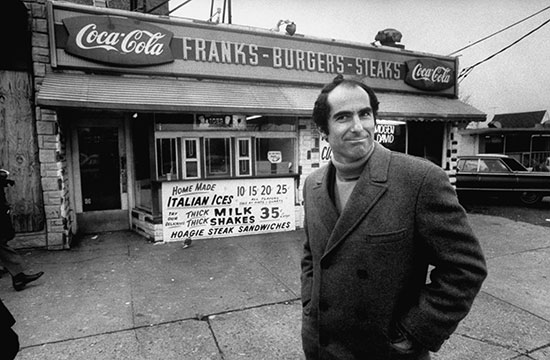
|
阿德尔曼生于意大利的佛罗伦萨,但是在纽约长大。在当上书商之前,他干过投行业务,之后还在马萨诸塞州与葡萄牙、意大利等国搞过进出口贸易。阿德尔曼有个朋友是书店老板,在他的鼓励下,阿德尔曼也想试试书店生意,便在112街和百老汇开了第一家Bloomsday书店。 书店名字的灵感,来自他在哥伦比亚大学读博士时读到的詹姆斯·乔伊斯的名著《尤利西斯》。1976年,他在81街和百老汇开了第二家店。“这次它是一家不错的书店了,店里还有分区。”书店的位置紧邻着Zabar’s美食城。(“我的朋友告诉我:‘如果你想开书店,离Zabar’s越近越好。’那里从那时起就很吸引人流。)结果这家书店开得十分成功,阿德尔曼干脆关掉了第一家店,把剩下的业务以高价钱卖给了莎士比亚书店(Shakespeare and Co)。 |
Born in Florence but raised in New York, Adelman’s career as a bookseller developed in between stints at investment banking and import/export efforts across Massachusetts, Portugal, Italy, and more. Urged by a bookstore-owner friend to also try his hand at the business, Adelman opened the first Bloomsday on 112th Street and Broadway. The name of the store was inspired by his reading of James Joyce’s Ulysses while pursuing his Ph.D. at Columbia. The second Bloomsday came in 1976 on 81st and Broadway. “This one was a legitimate bookstore with sections,” Adelman says of the destination, right by Zabar’s (“My friend said, ‘If you ever want to open up a bookshop, get as close to Zabar’s as possible. It was a magnet even then”), an endeavor so successful it led Adelman to close his first shop and eventually sell the remaining business for a hefty sum to Shakespeare and Co. |
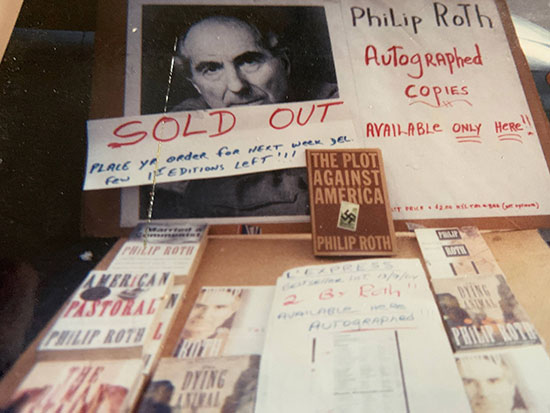
|
阿德尔曼第三次开书店,已经是80年代末90年代初的事了。还是那个当书店老板的朋友建议他这次开一个书摊。“我说道:‘你让我在Zabar’s门口开书摊?我原来在那儿还开了一家漂亮的书店呀,太丢人了吧!”于是他挪了几个街区,将书摊摆在了86街。“我知道这种情况迟早会发生的——有一天,有个人走过来说:‘你不是那个Bloomsday书店的老板吗?’我盯着他的眼睛说:‘对,就是我!’第二天,我就把书摊摆在了Zabar’s的门口。接下来的15年里,生意都做得很棒。”由于这个书摊的成功,阿尔德曼又在街角开了另一家实体书店,不过这个决定后来却让他后悔了。 提到“纽约人的懒惰”,阿德尔曼感叹道:“他们什么都从网上买,从食物到性爱,以及任何介于这两者之间的东西。”最终他关掉了这家书店,但那也是认识罗斯之后的事了。 |
The third Bloomsday came about in the late ’80s and ’90s, when the same friend who roused him to open in the first place suggested he try his luck at a book stand instead. “I said, ‘I’m going to open in front of Zabar’s, where I used to have a beautiful bookstore? What a comedown!’” He set up a few blocks away instead, on 86th Street. “But I knew [this] would happen sooner or later: Some guy came by and said, ‘Didn’t you own Bloomsday?’ I looked him directly in the eye and said, Yes, I did! The next day, I opened up in front of Zabar’s and did fantastic for [over] 15 years.” The success led him to open yet another brick-and-mortar venue around the corner—a decision he regrets. Mentioning the “laziness of New Yorkers”—“they buy everything on the Internet, from food to sex and everything in-between”—he eventually shuttered the shop, but not before first meeting Roth. |

|
如今,阿德尔曼主要靠在亚马逊上卖书为生。他手上还有不少罗斯签过名的书,此外他也写写书评。(“在他后期的作品中,我还有很多(剩余的)”。他说。)另外,他还在上西区出租了两个独立的仓库。 阿德尔曼能说一口流利的意大利语,他穿着一条破旧的牛仔裤和一件简单的衬衫,胸前口袋里放着一包骆驼牌香烟。他的屋子里堆满了书、签名海报,一台看起来跟环境格格不入的Mac电脑,和一架布满灰尘的钢琴。他对他自己的故事充满激情,让人不禁想问:“你为什么不自己写一本书呢?” 在描述自己的海外生活和在纽约的经历时,阿德尔曼显得很有精神。不过在说起罗斯时,他的眼神变得伤感了,最终哭泣起来。罗斯已经于2018年5月去世了。 |
Today Adelman sells mostly on Amazon: from the signed Roth books he still owns to review copies and more. (“Of his later ones, I have a decent amount [left],” he says.) He also rents out two separate storage facilities on the Upper West Side, spaces whose looks add to his overall image. Speaking Italian fluently and dressed in raggedy-looking jeans and a simple shirt with a pack of Camels peeking out the breast pocket, Adelman tells the story of his life. He’s sitting in a space filled with books, signed posters, an out-of-place-looking Mac computer and a dusty piano, exuding a passion for his very own tales that leads most to ask, “Why not write your own book?” Although coming alive while describing his life overseas and his New York adventures, when discussing Roth Adelman’s eyes turn sad, eventually coalescing into a cry undoubtedly catalyzed by Roth’s passing back in May 2018. |
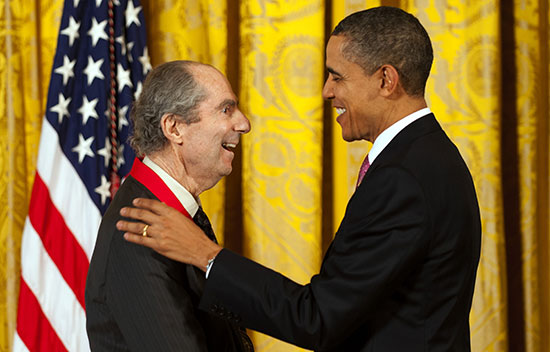
|
当然,面对这样一位文学巨匠的生前好友,人们总有很多问题要问,尤其是罗斯一向不喜欢公众和传媒的关注。很多人最好奇的是,罗斯生前最喜欢自己的哪部作品?对此阿德尔曼答道:《安息日的剧院》。 罗斯生前对特朗普怎么看?阿德尔曼表示:“特朗普当选时,菲利普非常沮丧。毕竟,纽约上西区是自由美国的心脏,如果你不是(一个自由主义者),你在这里就是异类了。” 罗斯跟他的父母关系如何?对这个问题,阿德尔曼想起了罗斯本人讲过的一件事。在《波特诺的报怨》出版之前,罗斯带他的父母出去吃了一顿饭。“他对他们说:‘听着,大家可能觉得我的书描写的是你们,但这些都是虚构的。这本书可能会引起很大反响,你们可能会接到记者的电话,但你们并不需要回答他们。’”很多年后,罗斯回忆起那顿饭,便问他的父亲,他母亲当时对他的话怎么看,因为他记得他母亲当时哭了。结果他母亲之所以会哭,是因为觉得他得了“妄想症”。说到这儿,阿德尔曼大笑起来。不过,回忆起最后一次见到罗斯的场景,阿德尔曼流下泪来:“我给他打了个电话(因为他得帮我在书上签名),但他没有打回来,我感觉很奇怪,就给他发了个短信,然后他回短信说:‘我在医院。’” 阿德尔曼到哥伦比亚长老会医院看望他。“我一进病房,就知道他不行了。他自己也知道。” 在与阿德尔曼(和罗斯的灵魂)进行了将近2个小时的谈话后,一个问题变得越来越迫切——阿德尔曼对罗斯的友爱如此之深,是因为罗斯签名的书让他挣了很多钱吗?虽然他并没有高价出售这些书。(阿德尔曼自己也戏称,这些罗斯签名的书“就是我的养老金”。) 他答道:“不是,我把他当成我一生最好的朋友。”(财富中文网) 译者:朴成奎 |
Of course, such proximity to a literary legend, especially one renowned for his eschewal of publicity and the media in general, calls for a number of queries, starting with, What was Roth’s favorite Roth book? “Sabbath’s Theater,” Adelman says. Roth’s thoughts on Trump, Adelman says: “When he was first elected, Philip was devastated. [After all], the Upper West Side is the heart of liberal America, and if you’re not [a liberal], you’re anathema.” How about the author’s relationship with his parents? Here, Adelman recounts a story told to him by Roth himself. Before the release of Portnoy’s Complaint, the author took his parents out to dinner. “He said [to them], ‘Listen, people will think that I’m describing you guys, but it’s all fiction. It’s going to make a big splash, you’re probably going to get calls from reporters, but you don’t have to answer them.’” Years later, Roth approached his father while recalling the dinner and asked about his mother’s reaction, who at the time cried. The reason? She thought he had “delusions of grandeur.” At that, Adelman explodes into a fit of laughter that turns into a muted, simple cry when recalling the last time he saw the author. “I called him [because he had to sign some books for me], he didn’t call me back, which was odd,” Adelman says. “So then I texted him and he texted back, ‘I’m in hospital.’” Adelman ventured out to Columbia Presbytarian to visit him. “The minute I walked into his room, I said that’s it. And he knew it too.” After close to two hours with Adelman and Roth’s ghost, one question becomes more and more urgent: Was Adelman’s love and devotion for the author a result of the money he made selling Roth’s signed books (“My 401(k),” jokes the bookseller), which he never sold at a premium? “Oh, no,” responds Adelman. “I considered him my best friend ever.” |






